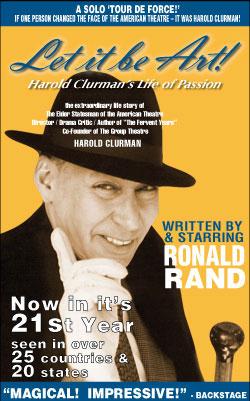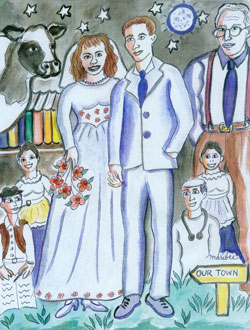Nancy Rhodes
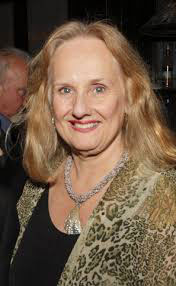 is a champion of new American opera. Ms. Rhodes is the Artistic Director of Encompass New Opera Theatre founded in New York City in 1975, dedicated to the creation, development and production of adventurous new music theatre and contemporary opera, and revivals of important musical works by American and international composers. Ms. Rhodes and Encompass New Opera Theatre have produced sixty-five full-scale productions, and over a hundred and fifty staged readings of new works. She has staged the world premieres of Kirke Mechem’s “Tartuffe” at the San Francisco Opera, Virgil Thomson’s “Lord Byron” at Alice Tully Hall, and new operas for the Brooklyn Philharmonic Orchestra, Pittsburgh Opera Theatre, and the Brooklyn Academy of Music, BAM Fisher. A renowned international Director, Ms. Rhodes’ productions include “Death in Venice” in Stockholm, “Carmen” in Oslo, “Happy End” in Finland, “Kiss Me Kate” in Ankara, “West Side Story” in Istanbul, and “Eccentrics, Outcasts and Visionaries: A Century of American Opera” for the Holland Festival. The numerous operas Ms. Rhodes has staged include Blitzstein’s “Regina,” Britten’s “Phaedra,” Antheil’s “Transatlantic,” and Virgil Thomson’s “The Mother of Us All.” Ms. Rhodes co-conceived and directed “Only Heaven” with composer Ricky Ian Gordon, and directed Grigori Frid’s opera, “The Diary of Anne Frank” at the Cleveland Opera. She was the Director of the first American musical performed at Albania’s National Opera House. Ms. Rhodes is the commissioned librettist of a new opera, “The Theory of Everything,” and recently directed the World Premiere of the new opera, “Anna Christie,” based on Eugene O’Neill’s Pulitzer Prize-winning play, by librettist Joseph Masteroff and composer Edward Thomas in New York City.
is a champion of new American opera. Ms. Rhodes is the Artistic Director of Encompass New Opera Theatre founded in New York City in 1975, dedicated to the creation, development and production of adventurous new music theatre and contemporary opera, and revivals of important musical works by American and international composers. Ms. Rhodes and Encompass New Opera Theatre have produced sixty-five full-scale productions, and over a hundred and fifty staged readings of new works. She has staged the world premieres of Kirke Mechem’s “Tartuffe” at the San Francisco Opera, Virgil Thomson’s “Lord Byron” at Alice Tully Hall, and new operas for the Brooklyn Philharmonic Orchestra, Pittsburgh Opera Theatre, and the Brooklyn Academy of Music, BAM Fisher. A renowned international Director, Ms. Rhodes’ productions include “Death in Venice” in Stockholm, “Carmen” in Oslo, “Happy End” in Finland, “Kiss Me Kate” in Ankara, “West Side Story” in Istanbul, and “Eccentrics, Outcasts and Visionaries: A Century of American Opera” for the Holland Festival. The numerous operas Ms. Rhodes has staged include Blitzstein’s “Regina,” Britten’s “Phaedra,” Antheil’s “Transatlantic,” and Virgil Thomson’s “The Mother of Us All.” Ms. Rhodes co-conceived and directed “Only Heaven” with composer Ricky Ian Gordon, and directed Grigori Frid’s opera, “The Diary of Anne Frank” at the Cleveland Opera. She was the Director of the first American musical performed at Albania’s National Opera House. Ms. Rhodes is the commissioned librettist of a new opera, “The Theory of Everything,” and recently directed the World Premiere of the new opera, “Anna Christie,” based on Eugene O’Neill’s Pulitzer Prize-winning play, by librettist Joseph Masteroff and composer Edward Thomas in New York City.
What led you to “IBSEN,” and decide that you wanted to direct the World Premiere of the first opera about the great Norwegian playwright, Henrik Ibsen, in Bangalore, India, and its tour across Asia, conducted by Dr. Ashley William Joseph with the Indian National Symphony Orchestra?
Well, first of all because of Ronald. We’ve known each other for some years and have followed each other’s work. He told me how his opera libretto creatively came to him, how he felt that Ibsen was speaking to him across time and space, and I was intrigued. Ibsen’s profound ability to realize deep truths in his women characters and the stories he chose to write were far ahead of his time, and controversial too. Ibsen’s courage and ability to listen to his muse is something Ronald brings out in his opera libretto.
Early in my career, I worked on two Ibsen plays at the Roundabout Theatre and I experienced a landmark production of “Peer Gynt” in Finland, that has stayed in my mind’s eye ever since.
The opportunity to direct the premiere of an opera that explores the soul and mind of Ibsen himself and to do that with an international composer from Germany, and to work with a conductor, cast, musicians and dancers from the great country of India, with a planned tour of Asia, this will be an experience of a lifetime.
I love bringing music and stories to fruition in the company of artists from different cultures. By immersing myself and seeing the piece through their perspective lens, I gain new insights that give nuances and deeper feelings to the creative work.
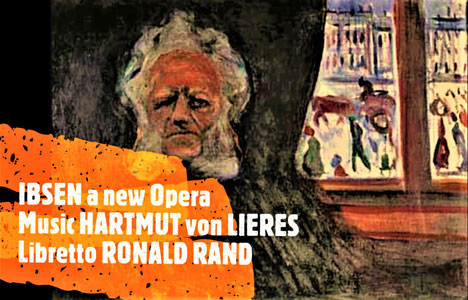
Why do you feel it’s important to have an opera such as “IBSEN” bring to the forefront the issues of women’s and girl’s empowerment today?
It is clear, the world needs re-balancing: questions of who holds the decision-making, power positions? How are the Earth’s resources divided up since Planet Earth is one household for all humanity? How do we treat animals and wildlife? How do we treat children, the aged and the vulnerable?
Throughout the world, women have been relegated to a backseat status, no matter where they are born. Ibsen explored power structures in all his plays, and he certainly examined the role women have in personal relationships and in society. The MeToo Movement opened a door that was locked shut for ages.
Add to that, five hundred years of colonialization, exploiting cultures and people, robbing the planet’s resources for the gain of a few, and we can see how our beautiful, life-giving Planet is so completely out of balance and in trouble. Now we have the corona virus that has attacked the entire world.
To me, it’s a clarion ‘wake-up call’ from Mother Nature herself, who is bringing the world and the human species to a critical awareness of what we are doing to ourselves and nature. Look at the destruction of the habitat for wildlife, and for people throughout the world who struggle for clean water and enough food. We have a lot to do to re-think and re-balance and re-envision our world. Mother Nature gives us the opportunity now to awaken and change.
Ibsen’s play, “The Wild Duck,” explores the role of illusion and self-deception in everyday life and focuses on an extremely close relationship between the fourteen-year-old daughter and the wild duck of the title.
How would you describe Encompass’s mission over the past forty-five years?
Encompass New Opera Theatre’s mission continues to be to create and produce new music theatre, and American Opera that is inspired by ideas of ecology, science, philosophy, cosmology and mythology – to explore compelling stories and issues that reflect the world we live in today.
We look to the Ancient World and indigenous cultures for inspiration, wisdom, and knowledge.
Pythagoras, the great Greek Mathematician, who was also a musician, an astronomer, a philosopher, and a healer, believed the universe was music, literally music.
So, in thinking about creativity in bringing new opera to life, we embrace these ideas that broaden the scope of human potential and human experience. Music is a meaningful and soothing expression in our fragmented and uncertain world. I think the great American composer and conductor Leonard Bernstein expressed the power of music when he said in 1963: “This will be our reply to violence: To make music more intensely, more beautifully, more devotedly than ever before.”
Plato, one of the great philosophers of the ancient Greek world, wrote: “Music is a moral law. It gives soul to the universe, wings to the mind, light to the imagination, and charm and gaiety to life and everything.”
Six years ago, we created an outreach program, “Paradigm Shifts, Music and Film Festival” to celebrate people around the world who are preserving our planet, oceans, wildlife and sacred lands.
Dedicated to bridging indigenous cultures, women’s wisdom, and social justice-environmental issues, each film is paired with vocalists, musicians, and dancers performing a variety of music from jazz and gospel, to classical, folk, African, Tibetan, Native American, and contemporary chamber music. In 2017, the Festival traveled to Seoul, South Korea where we worked with Korean musicians for our Paradigm Shifts Program.
As Albert Einstein said: “Look deep into nature, and then you will understand everything better.”
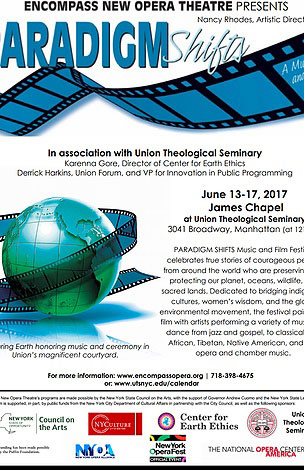
You were also inspired by and had a singular connection to the great composer, Virgil Thomson.
I pay a great homage to my mentor, the great American composer and music critic, Virgil Thomson, who inspired me and became the founding composer for Encompass New Opera Theatre.
He composed two landmark American operas with Gertrude Stein. His opera, “Four Saints in Three Acts” in 1934, was the first American opera to play on Broadway at the 44th Street Theatre, with an entire African-American cast, and a beautiful set made out of cellophane by the female set designer, Florine Stettheimer. “Four Saints” pre-dated the opera, “Porgy and Bess,” and certainly influenced George Gershwin. In 1946, Virgil and Gertrude wrote “The Mother of Us All,” about the life and times of Susan B. Anthony.
I first met Mr. Thomson at his home in the Chelsea Hotel when I was preparing to direct his opera, “The Mother of Us All.” I was twenty-two and he was eighty-two, and we hit it right off. He changed the course of my life and the focus of my career from that day on. That was a pivotal day for me because I experienced two very important things.
Mr. Thomson invited me to sit on his velvet settee surrounded by paintings from Matisse and Picasso. He then jumped up and began playing through key sections of the music. Virgil sang some of it, and we freely and enthusiastically exchanged ideas. He said “Yes,” to some unusual staging ideas I had.
A master saying “yes” to a young artist coming into intimate contact with his/her creative work, is an extraordinary gift, a gift that I will always cherish. That first meeting with Virgil set the tone ever after for all my meetings with composers, seasoned or new. We would sit together at the piano and exchange ideas through the music.
Virgil Thomson (photo by Carl van Vechten, restored by Adam Cuerden, from the collection of the Library of Congress)
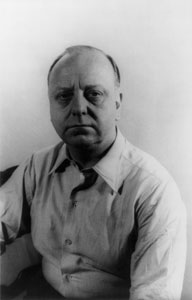 How did your time with Virgil Thomson and his work influence Encompass?
How did your time with Virgil Thomson and his work influence Encompass?
When Encompass began in 1975, it was with a new production of “The Mother of Us All,” which we performed at the Good Shepherd Faith Church, next door to Juilliard. Our production was recognized and was cited as one of the best productions of 1976, and launched Encompass, establishing our ongoing mission of producing contemporary opera.
Since then, remaining true and faithful to Virgil’s vision and dream, Encompass has gone on to premiere more than sixty-five new and rarely performed American and contemporary operas with orchestra, and produce over a hundred and fifty-five staged readings of new works from jazz and cabaret to musicals and opera.
One of the other things I learned from Virgil was that it was pretty rough sailing for American composers of opera to get their works done in the United States in major opera houses because the emphasis was on performing the masterpieces of 19th Century Europe.
This was one of the reasons so many American composers went to Paris for musical opportunities – Virgil Thomson, Aaron Copland, George Antheil – initially to study with the great teacher and musician, Nadia Boulanger, and eventually they all gathered at Gertrude Stein and Alice B. Toklas’ famous Paris Salon. It was truly a fertile and fervent time until World War II broke out, and everybody came home.
How would you describe what creativity means to you?
We have often elevated the word, “creative,” sometimes imbuing it with the sense, that only certain people or certain powers can create; or that perhaps artists, writers, composers, inventors are the only ones deemed creative. However, I believe every living person is creative and every day of living is a creative opportunity and act. The difference comes in how we express our creativity.
I once jumped into a taxicab coming uptown, and as soon as I got in, I was amazed. The driver had decorated the ceiling and sides of the cab with beautiful photographs of the sea, waterfalls, three-dimensional flowers, gorgeous trees, and foliage, and for the duration of the ride I was transported into a breathtakingly delightful world of nature and water.
I’ve taken hundreds and hundreds of cab rides since then and I’ve never forgotten this one. He even had some soothing music playing too and he was a happy man. The driver was expressing his creativity, creating his vision by making a beautiful environment with the tools and skills that he had; and he shared his vision of the world every single day.
I remember that experience as much as I remember seeing Edvard Munch’s painting “The Scream” in an art gallery in Norway or experiencing the “Mona Lisa” in the Louvre.
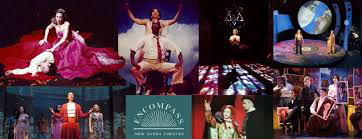
What does it take for an opera to be created?
The composer and librettist are the architects who create the story and music from the ground up. They must draw us into their world, their way of seeing and hearing. Their creativity results from originality of thought and imagination, a lot of perseverance and some good old-fashioned perspiration.
It can be a lonely road creating an opera or any work of art, a job not always well understood in our culture, perhaps not always seen as a real job.
You have to take a lot of chances that may or may not pay off in the financial department; the old adage “the starving artist” comes to mind, and sometimes the arts are seen as the icing on the cake, an extra-curricular activity; but the neuro-scientists are proving that the discipline and skills of music make for high-level skilled professionals.
Composers and writers are compelled to express themselves in their own times. Their job is to reflect and express something about being human, about life. To explore, challenge, delve into some aspect of what is happening in the world today or in the past, and bring it into focus.
Can you describe the steps in creating a new opera.
First: have an idea. second: create the Libretto – the words and the story. third: compose the music – create the piano/vocal score. fourth: workshop the opera – and work on revisions. fifth: orchestrate the opera, and sixth: Have the World Premiere.
Albert Einstein said: “Imagination is everything. It is the preview of life’s coming attraction.”
You have to start with: What is the story? Does it follow a quest? Does it have conflict? Are the characters interesting, unique, fully fleshed out as people? Does it sing? Will music add to it in a compelling way? Does it demand musical expression?
Martin Luther King, Jr. said: “Faith is taking the first step even when you don’t see the whole staircase.”
It has been popular over time to adapt a play, book or movie into an opera or a musical. For example, “Carmen” is based on Prosper Merimee’s novel, South Pacific, which is based on a James A. Michener’s novel. American composer Robert Ward chose Arthur Miller’s play “The Crucible” for his opera, and composer Carlisle Floyd set John Steinbeck’s novel, Of Mice and Men, and Ricky Ian Gordon set Steinbeck’s The Grapes of Wrath to music as an opera.
Today, it is becoming more and more inviting to create an original libretto. Many composers look for playwrights, lyricists, poets whose words are sing-able, and who can write text that can be sung with nice vowel sounds.
The dramatic spine of the story, building climaxes, creating interesting, unique characters is vital. Also, thinking about creating arias, duets, trios, quartets, ensembles are necessary so the composer can musicalize the text, and requires that the librettist who writes the libretto is keeping music in mind at all times. Sometimes composers create their own libretto.
I staged the world premiere of Kirke Mechem’s opera of “Tartuffe” by Moliere for the San Francisco Opera. He did his own libretto, but he told me that he watched a theatre production of “Tartuffe” at least ten times before tackling the libretto. Today, it is one of the most produced American chamber operas.
Preparation often involves readings of the libretto by actors and singers to learn how the dramatic flow is working. Do the scenes drive the story forward? Are the characters fleshed out? Does the action advance the storyline?

When the libretto is ready, the composer can go to work to compose the music. One thing I know for certain is that it is a lonely job and takes a concentrated amount of time.
Music composition requires deep focus and concentration over a period of time, the same for creating the libretto. Composers live each character as they write the music, going inside the character’s emotions and thoughts, and setting each word and phrase. It is not some random thing, they actually live each word and thought and experience the emotion.
It is really important for a composer to have someone listen to their work during the writing process: composers often call me on the phone. One time, Ricky Ian Gordon called to tell me that he had just written music for a Langston Hughes poem, and asked if I wanted to hear it. He put the phone down on his piano and played and sang through his new composition. A joyous experience for me!
As the opera progresses, the creative team of the stage director, music director, and a dramaturg can guide the piece. The process of composing can sometimes take two to six or more years before the opera’s premiere.
Workshopping of the entire opera is a necessary piece of the puzzle, with the last step in the creative process – orchestrating the opera. Opera composers almost always create their own orchestrations. In Broadway musical theatre, most composers engage an orchestrator to do this work.
Finally, in the end, there must be support for the production from co-producers and a theater, followed by the casting of the opera, marketing, press, rehearsals, creating the set, costumes, lighting – and the show is ready for its World Premiere!
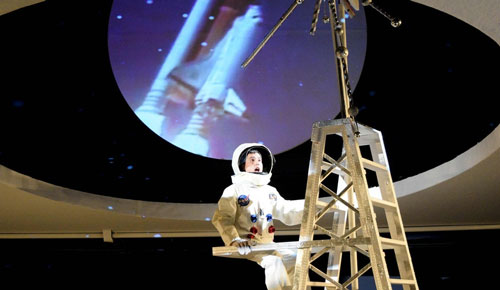
“The Theory of Everything” by Nancy Rhodes and John David Earnest
You also created your own new opera, “The Theory of Everything,” with composer, John David Earnest.
William Blake wrote:
“To see the world in a grain of sand,
And to see heaven in a wildflower,
Hold infinity in the palm of your hands,
And eternity in an hour.”
I used these famous words of William Blake in the opera libretto I created, which was inspired by a long interest and study of quantum physics and metaphysics, and a deepening exploration of indigenous cosmology.
The first scene came out of a dream when I awoke at 4:30am at the seashore, sitting up, I said out loud: “Act I, Scene I, a planetarium, and “The Theory of Everything” began.
The story is a human story of a family, the mother is a documentary filmmaker studying near-death experiences, the father a Brazilian quantum physicist who grew up in the Amazon, and their eight-year-old daughter is a budding young astronomer.
Things happen, separations come, tragedy strikes, and through these events all the characters experience a journey of self-discovery; in the final scene, they come together, high up in the Andes Mountains with the Elders of the Q’ero tribe.
Another new opera you directed was the premiere of Evan Mack’s new opera, “Angel of the Amazon” in 2011, based on the true story of Sister Dorothy Stang from Ohio.
Yes, Sister Dorothy Strang went into the rain forests of Brazil to help gain land rights for indigenous families. She ran into conflict with the logging industry in Brazil when they began cutting and burning the rain forest. She spoke out about it at the Brazilian Congress.
In 2005 at the age of seventy-three, while she was walking down a lonely road, two gunmen approached her, and killed her. Her legacy of protecting her beloved Brazilian families and the Brazil rainforest lives on in the opera.
Evan Mack, the composer of “Angel of the Amazon,” was finishing up his doctorate at Cincinnati Conservatory when he heard the story of Sister Dorothy. In a white heat of passion, he wrote both the libretto and the music. Albany Records released the CD of the Encompass premiere and Opera News gave it high praise.
You also recently directed the recent World Premiere of “Anna Christie,” based on Eugene O’Neill’s Pulitzer Prize-winning play, with a libretto by Tony Award winning lyricist Joseph Masteroff, and Grammy-nominated composer Edward Thomas in New York City. What was that experience like for you and what kind of a collaboration was it between the librettist and composer?
The experience was hugely rewarding to be drawn into O’Neill’s spiritual connection to the sea and come into close contact with his compassionate understanding of women and the hardships of their lives.
We were fortunate to have Joseph Masteroff and Edward Thomas participate in our initial workshop in 2017 of “Anna Christie” for “Page to Stage,” a forum for the development of new opera. Midge Woolsey moderated an audience talk-back with the creative team and singers after the performance.
At one point, Joseph Masteroff announced to the audience that it was his birthday and he was 98 years old! Everyone gasped. He also wrote the book for the legendary musical, “Cabaret,” for Sheldon Harnick’s “She Loves Me,” and Edward Thomas and Joe wrote another opera together based on O’Neill’s, “Desire Under the Elms.”
Being in their presence, hearing two masters speak about their work was inspiring. The singers brought a depth to their characters even at this early stage.
A year later in 2018, I directed and produced the world premiere of “Anna Christie” at the Baruch Performing Arts Center, here in New York. We were fortunate to collaborate with the conductor/music director Julian Wachner, and a superb cast starring Melanie Long as Anna Christie, Frank Basile who played her father, with Joy Hermalyn, Jonathan Estabrooks and Mike Pirozzi.
We went on to make the cast album of “Anna Christie” with producer Thomas Z. Shepard, winner of twelve Grammys, and Broadway Records released it, which was their first full-length opera on their label. We were all thrilled when “Anna Christie” reached number six on the Billboard charts for classical music.
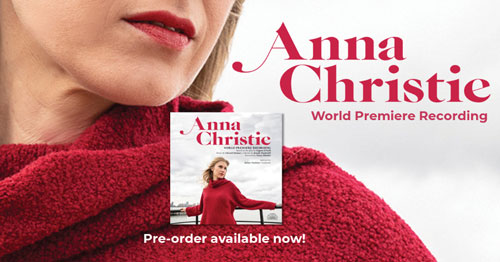
In the midst of a very trying period in the history of the world, what compels you to forge ahead wanting to bring another opera like “IBSEN” to the world stage?
To work, to be part of something bigger than me, to connect with others who are curious and courageous enough to roll up their sleeves and dig deep into the stuff of life.
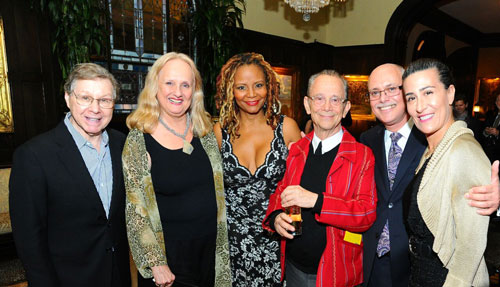
L.to R.: Maury Yeston, Nancy Rhodes, Tonya Pinkins, Joel Grey, Daniel De Siena, Jeanine Tesori at Tribute for Joel Grey and Jeanine Tesori









































